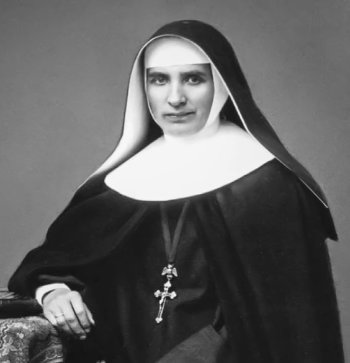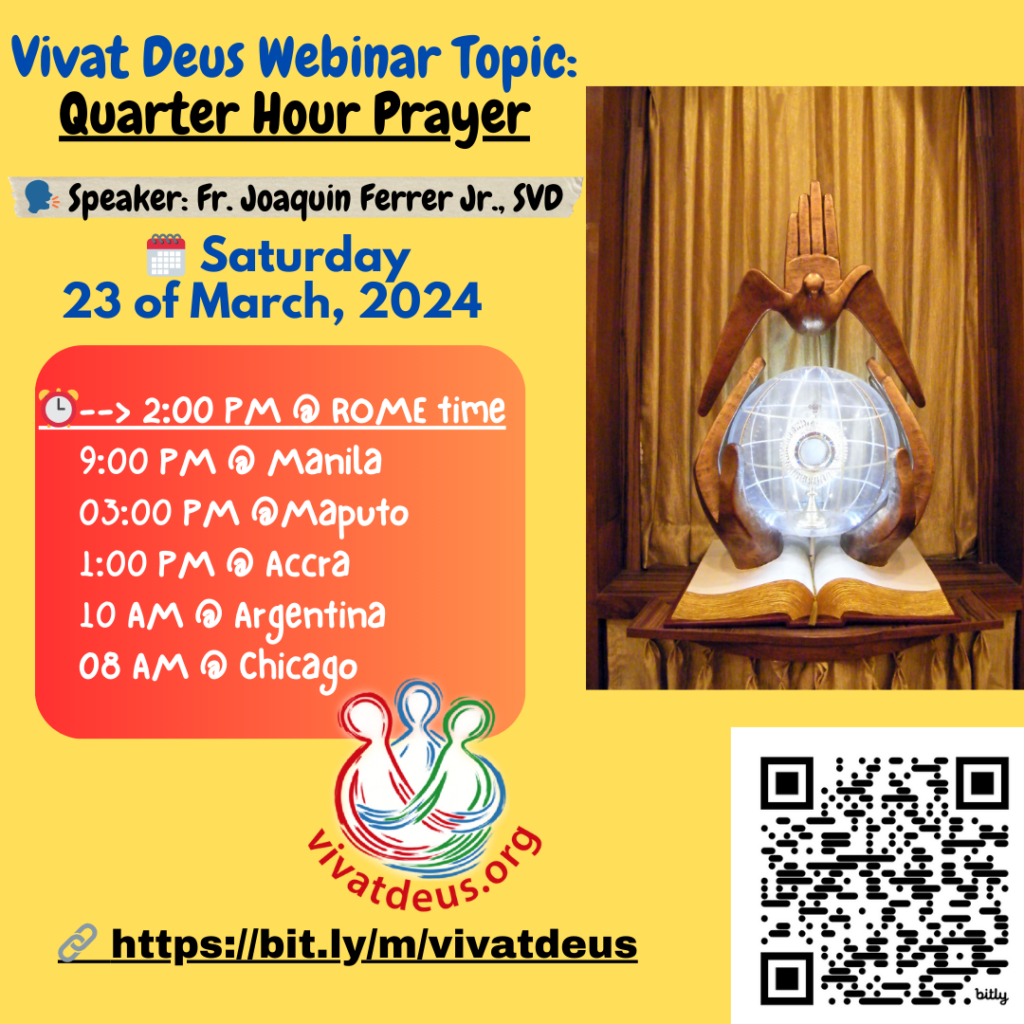This is a voyage of discovery and a reflection on this great woman who set our Congregation on course.
Unlike the two co-foundresses, Mother Theresia wrote a great deal, mainly letters, but also other things, such as instructions or regulations and some reports for “the future generations”. In this reflection we can only look at some of her letters to try and see what they tell us about her as a person.
In Mother Theresia’s time women had very little academic training. It was a time when the sisters had no Bible of their own, no books of their own, no theological training and all the liturgy was in Latin.
The director general Fr. Hermann auf der Heide, the representative of Arnold Janssen for the sisters and director for many years after the death of the founder was a great help, especially in business matters, canonical questions and so on, at a time when women lacked business knowledge and were not taken seriously anyway. He took our sisters and the Adoration Sisters very seriously and promoted their development.
Much in M. Theresia’s letters is relevant today. Mother Theresia was a very caring woman. Some background aspects: She had lived for many years with Mother Maria and Mother Josepha and learnt from their example. She joined the Congregation as the eleventh member and by the time she took over from Mother Josepha she knew every sister in the Congregation and almost every sister had been under her guidance. Arnold Janssen had her direct the first group of sisters preparing for final profession, although she was one of the group herself, as was Mother Josepha.
Comment:
Mother Theresia Messner joined the Congregation in 1891 at the age of 22½ , was in the first group to receive the habit in 1892 and was also one of the first twelve to take vows in 1894. She personally experienced the formation of the Congregation through the instruction and guidance of Arnold Janssen and Hermann Wegener, as well as the leadership, care and guidance of Mother Maria until 1898. Eight months after her first vows (then aged 26), she was appointed novice directress. In 1900 she became M. Josepha’s assistant but remained main directress of the novices and of the young professed sisters. She worked closely with M. Josepha and was virtually in charge of the Congregation during the final months of M. Josepha’s illness.
Mother Theresia had a wealth of experience in the accompaniment of young sisters. During her own first months and even years in the religious life she suffered great homesickness in the strange, northern surroundings. She understood only too well the struggles of the young professed sisters and saw the lack of ability and experience of the young sisters-in-charge. Even when she was elected superior general by the General Chapter in 1911, many of those community leaders were still in temporary vows.
In Mother Theresia’s letters we detect mature wisdom. A few characteristics shine out from her letters, especially those to the sisters-in-charge. I would like to take a look at some of them here.
Simplicity, understanding/caring, prudence, foresight, pragmatism (common sense, down-to-earth) decisiveness.
Simplicity – first letter as superior appointed by Arnold Janssen, 20 July 1903:
“I am well aware, my dear Sisters, that I am neither worthy of this honour nor strong enough for the burden. … But I believe I can find strength, courage, confidence and trust in the expressed will of the superiors. … I ask all of you, dear Sisters, to support me with good advice and with your prayers. I count very much on your prayers: that is why I urgently ask for the alms of your prayers.”
To Sr. Xaveria in Argentina, July 1904:
“I would happily follow your invitation to go to Argentina if Fr. Superior General found it useful to send me, but to offer myself would be lacking in humility. If you think it would be good, express your wish to Rev. Fr. Superior General or Rev. Fr. auf der Heide. “
Between 1904 and 1911, that is before she became an independent superior general, M. Theresia wrote many letters to individual superiors and other sisters. First, however, we will take a look at the general letters to the community leaders.
Understanding, Caring
During her first visit overseas, Mother Theresia became concerned about the sisters who had been placed in charge of others. She visited the sisters and houses in the United States. Apart from sorting things out with regard to work and relations with the SVD, she observed the relationships among the sisters. On 11 July 1912 she wrote her “Hints for Sisters-in-Charge”, based on her firsthand experience, backed up by letters she had received over the years from sisters in other missions.
She wrote:
“Notwithstanding fidelity to the Rule, new, young superiors must endeavor to guide their Sisters with great mildness and indulgence and above all they may not proceed with police-like strictness – that repels and robs the Sisters of courage and trust.
“The community leader is also to have a genuinely open eye for the needs of the Sisters.
“It is better to be good than to be too harsh when in doubt about what the right thing is.
“These reflections are not a product of my own ideas but of experience.
Happy the community leader who strives to learn from experience, she will be saved many a mistake.”
In 1913 she wrote again to the sisters in charge, this time “On the formation and guidance of the newly professed Sisters”:
After describing the difficulties a young sister might experience after leaving the novitiate, she poses three questions:
- How is the superior or community leader to go about helping the sister to adjust quickly and well and to feel at home?
- What are the obligations of the superior or community leader with regard to the spiritual accompaniment of each sister?
- How are they to deal with sisters whose achievements with regard to work or teaching are at first less than satisfactory?
She expanded at length on these three questions, stressing the need to make the young sister feel welcome and at home, the necessity of giving her a suitable task, and the duty of the superior to be a guide and leader for the young sisters.
She added: “As much as for the spiritual well-being, the superior is to care in a motherly fashion for the physical well-being of the sisters.”
Practical
Theresia was also eminently practical. In that same letter she remarked: “Perhaps one or the other superior will say to me, ‘We can only use good, sacrificial sisters who can teach and work well.’ Wait a minute” – writes M. Theresia – “were we all efficient from the start? Did we not gradually become so, always supposing we have reached that point?”
She explains the impossibility of training the large number of novices in every aspect of the work and then states: “Those superiors serve the Congregation best who understand how to train sisters and make them efficient.” (That point entered our Constitutions and you can still find the thought today in C 303.)
In 1914 some more hints for community leaders were apparently necessary and to underline that necessity M. Theresia required that this letter was to be read during the so-called Ember days or, in other words, four times each year. She opened her admonitions with: “The office of superior is a sacred but very thorny one.”
She explained that, “Much love and great good sense are necessary in leadership. Love that comes from God and leads to God; good sense not in the manner of the people of this world, called ‘know how’, but a prudence given by the Spirit of God that has constantly to be implored in prayer.”
Prudence
There she touched on a point that she later found needed more elaboration. In 1917 she discussed the virtue of Prudence.
“To be able to work fruitfully in her position, every superior needs mature piety and the necessary prudence. There is enough instruction on piety to be gained from spiritual talks, reading, etc. but in general we are less informed with regard to prudence. Yet this is precisely the virtue that superiors absolutely need and the following teaching will surely be most welcome. If faithfully followed it will lighten the superiors’ burden of office and assure them of God’s blessing.
“It is not worldly prudence that a superior needs but the wisdom of the Holy Spirit. To become prudent you do not need either exceptional talents or profound academic knowledge. You must possess and make use of healthy common sense.”
She gave some pointers for prudent behaviour:
“Beware of innovations in a house where you have newly arrived…”
“Every superior should be concerned to uphold each of her sisters, both with regard to the other sisters as well as lay persons.”
“Beware of prejudice.”
Often admonish the sisters to be careful how they talk when speaking with outsiders, especially on journeys and in the reception room.
Foresight
In the same letter she wrote: “A superior will try to settle all business matters with church or civil authorities with the greatest care and circumspection.
“For all matters of greater importance you must know when to approach the higher superiors in good time.”
And echoing a previous thought: “Superiors who know how to train their sisters well, to make them skilful, capable and dutiful, act far more virtuously and in that prudent way do far more good for the individual sisters and the Congregation than those who think they have to do everything themselves.”
Difficult Situations
Mother Theresia was no stranger to difficult situations. Before she took her first vows in 1894, 18 persons had left at various stages after entering the congregation and before she took her final vows in 1903 another 14 had left – that is 32 women in 12 years. There were several dramas and in the narrow confines of the Notre Dame convent, they must have been known to everyone. Moreover, she had been novice directress, a member of local council and for three years the assistant of M. Josepha.
She was patient with difficult sisters, seeing them rather as sisters with difficulties. In her general letter in 1913 she wrote that the superior was “not to grow weary if at times, as it may often seem, she has a very difficult sister on her hands. She may not immediately entertain the thought of soon ridding herself of such a sister because she makes things difficult for her and the community. Rather she is to try to win the trust of such a sister… At the least she will try to bear patiently with a sister with a difficult character and also encourage the other sisters to do the same.”
Mother Theresia made another relevant point: “The individual stations must also bear part of the burdens of the Congregation and may not think that such sisters belong only in the provincial house or Mother House. As every superior knows, they already have the most unpleasant and difficult part to bear.”
Long before writing that general letter she had endeavoured to encourage individual superiors. In March 1904 she wrote to Sr. Andrea in Argentina:
“Dear Sister Superior Andrea, you can put your mind at rest about what you wrote concerning Sister Ignatia. Such natures mean quite well according to their conviction and may be excused before God…”
Obviously reflecting on the experiences in Steyl, she wrote in May that same year to Sr. Andrea regarding admissions:
“The direction (of postulants and novices) has gradually become somewhat different; we are richer in good and less good experiences. On the one hand the direction is milder, on the other stricter than before. Milder in that we endeavour to take more into account the physical and spiritual weaknesses that we are all burdened with, while on the other hand we try to have a sharp eye for flaws of character.”
She could also admonish a superior about whom she had received complaints. In November 1906 she wrote to Sr. Martha in PNG:
“Dear Sister Martha, beware of irritation and uncharitable behaviour, of harsh, hurtful words in an agitated tone of voice. You see, Sister Martha, agitated words and reproaches are like poison darts that penetrate the heart, wounding and causing bitterness; then the relationship between superior and Sisters is disturbed and both sides suffer.”
In 1905 M. Theresia was in hospital for many weeks because of the trouble with her foot. Nevertheless she was concerned about individual Sisters. Sr. Crescentia Wurm, a young sister sent to Brazil, could not settle down. Sr. Walburgis, superior and foundress of the mission in Brazil had mentioned the situation in one of her letters. In June M. Theresia replied from her hospital bed:
“I am sorry that things do not work out well out with Sr. Crescentia. Please write everything about this matter! Perhaps Sr. Crescentia would do better under a different superior? If that seems to you to be the case, send her to a different station. On the other hand, one should not discard a cross only to burden others with it.
Then in November that same year, still in hospital she wrote a long letter personally to Sr. Crescentia. Here just a short quote:
“I only feel sorry to see from your letter that you are homesick. I feel very sorry for you but I hope it will soon pass. It must be a test for you by which you can prove yourself. Keep close to the Lord, he knows all our troubles.”
In that same letter to the Sister, M. Theresia went on to write conversationally about herself and her experiences in the hospital.
At the same time she wrote to Sr. Walburgis:
“Sr. Crescentia wrote to me about her homesickness and that she found it so difficult to have to choose between Juiz de Fora and Ponta Grossa. I would really prefer that the Sisters were not given the choice so easily; either they will then always want the same thing, or they will be forever restless. For the rest Sr. Crescentia seems to be content; she is not complaining about anyone, she only wrote [that] it seems as though Sr. Superior does not bother about her much and that hurts her and makes her feel really left alone. You wrote the same thing to me, dear Sr. Walburgis. You [said] you want to limit yourself to praying for Sr. Crescentia.
“I am not scolding you for that because you believed it was the best, but it appears that it is better after all if you care for Sister Crescentia in a truly motherly fashion and I would sincerely request you to show a really loving manner towards the Sister. It is certainly often difficult always to be good and gentle towards Sisters whom we do not like so much …
“Dear Sr. Walburgis, you will try once again with Sr. Crescentia, will you not? It will do her good and I hope for the best from her.
“Please read my letter to Sr. Crescentia and then close it.”
Understanding for Superiors
November 1903 to Sr. Leonarda in the United States:
Take good care altogether that you are not overburdened with too much work. As good as they often are, the priests often have little understanding of women’s work and women’s strength;
Sr. Blandina, China, 18 Dec. 1905
First of all I send my heartfelt congratulations on the new office which holy obedience has placed on your shoulders. Indeed, although it will not bring you many roses, if you endeavour to become all things to all and strive more and more to acquire the art of governing others, you will be able to do much good for God, for souls and for the Congregation. For leadership especially prudence, love, kindness and vigilance, selflessness and love of sacrifice are needed. Since we can do nothing without grace from above, we have to pray very often for the light and grace of the Holy Spirit; He will help us.
Sr. Wilhelmine , Argentina, February 1906
How many postulants do you have? You wrote that you took up your office with fear and trembling. I can well believe that because spiritual guidance is the greatest of all arts. You have not had much practice in that yet and the country and its people are still new to you …
Beginners cannot avoid sometimes making mistakes or lacking in prudence. That is how you learn. But it can be costly if you always first have to find out in that way how to be prudent.
Understanding for the sick
Sr. Crucifixa Wellmann, 1906, Argentina
Dear Sister Crucifixa, if you are sent here (back to Steyl) by your superiors, which I still cannot believe, then you are certainly sincerely welcome; as is also Sr. Bernarda [Böminghaus]. In any case, leave all up to the most holy will of God. Our good God will let everything turn out for the best. He strikes us but he also heals again.
That you sometimes find it difficult, I do truly believe. To be sick but still able to work is not nearly as difficult as to be condemned to inactivity through illness. I know that from experience.
If this letter still finds you in Argentina, as I hope, I wish you a truly blessed and joyful feast of Easter; in the other case we can soon talk to each other personally.
As it turned out, both Sr. Crucifixa and Sr. Bernarda remained in Argentina and were able to work well there.
Finally a few words of consolation for community leaders:
In 1906 Mother Theresia wrote to Sr. Regina in Brazil:
Everything has to be learned, that is no less valid for the art of guiding others. We need not be too upset if we are not able to satisfy everyone; the good Lord could not even satisfy his apostles, but we must make the effort to be guided by love and prudence in the leadership of others.
Meanwhile I heard that you exchanged Sr. Cordula and Sr. Suitberta. Sr. Cordula is a good, peace-loving sister and so we may hope that this exchange will favour peace in the small community. …
Dear Sr. Regina, I am sorry that you encounter so many hindrances and difficulties in your leadership of the sisters.
Mother Theresia’s prayer:
May the good Lord grant our Congregation many wise and selfless superiors who know how to train capable and mature religious who will develop into pillars of support for the Congregation. Much grace is needed for that but on our part also great virtue, prudent teaching skills and selfless work.








One Response
Thank you for the write up on Mother Theresia Messner. After reading “Burning Passion for God and his People”, I just love her after Mother Maria and St. Joseph Freinademetz. So very inspiring ..and I am glad to belong to the Arnoldus family. Today especially, am indebted to St. Arnold and our First Mothers for the precious gift of our SSpS family.
Thank you, Sr. Jacqueline Mulberge SSpS